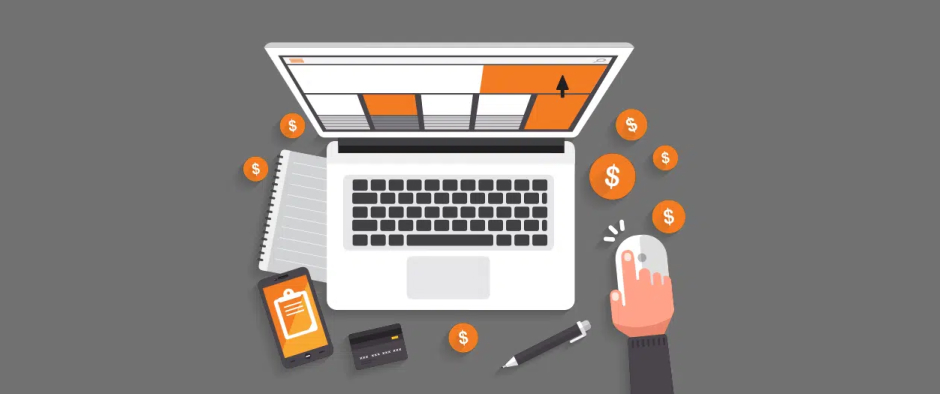What is Pay-Per-Click Marketing?
Pay-Per-Click or PPC Marketing is a system that allows advertisers to pay each time they get a click on their ad. Most commonly this system is seen on search engines, particularly on Google.
When a searcher clicks on an ad on the Search Engine Results Page (SERP) they are generally brought to the website of the advertiser and the advertiser pays for that click. In short, it is a way for businesses to pay for visits to their website instead of gaining that traffic organically through Search Engine Optimization (SEO).
There are a multitude of reasons and ways to use PPC marketing to reach your specific goals and we’ll explore 5 of them here.
1. Faster Visibility & Results
One of the main benefits of PPC advertising is that you can quickly set up a PPC campaign and have your ads out in front of potential new customers creating visibility for your brand and bringing traffic to your site. With the right keywords, ads, and budget, you could have your ads visible in the top positions on the SERP within a couple hours of set up. In comparison, visibility with SEO is often not something attained quickly or easily.
Generally, a ramp up period for SEO is going to be something like 4 to 6 months to truly start seeing results. It can also be extremely hard to show on the first page for relevant keywords even with a lot of good SEO work. And while any digital marketer worth their weight would say that SEO is definitely worth investing the time and effort in, the ability to see quicker results is definitely a benefit to running a PPC campaign.
2. Occupy More Real Estate On the SERP
Even if you are killing it in the SEO game, taking up more real estate on the SERP is only going to help improve brand awareness and give the searcher multiple chances to click on your site over a competitor that shows up for a search. Google PPC Ads gives you even more space on the SERP with things like call out extensions, site link extensions, and call extensions that give people the ability to call you directly from your ad without having to go to your website. All of these allow people to see more about your business and gives them a greater opportunity to give you their business. Not only that, but according to Google AI, 89% of traffic created by search ads are not replaced by organic clicks once the campaigns are paused.*
3. Brand Awareness
Brand awareness helps to pinpoint what makes your company stand out and ultimately allows these unique selling points to help show the value in choosing your company or product over another. With the quick visibility one is able to achieve with PPC, even if a user isn’t clicking on your ad that appears in their search results, it gives them an opportunity to see your company/brand and whatever information you’ve decided to add to your campaign. This can include services you offer, differentiators for your business and even various promotions you’re running. While the focus for PPC is most often to drive traffic to a website or to get a user to convert into a customer immediately by calling or sending in a lead form, building brand awareness can be critical for your business. PPC can bring more awareness to your company or product.
4. Trackability & Testing
One great thing about PPC campaigns is the data you can obtain. With more traditional marketing, it is hard to know sometimes if you are truly reaching your target audience. With PPC ads, high level details like impressions, clicks, and conversions are easily measurable with appropriate tracking. Along with the basics, things like which locations are getting the most clicks and leads or which particular searches are bringing you the best cost per lead are quickly accessible as well. It is even possible to see which days of the week and time of days your ads are performing the best. Along with all this data, Google Ads offers the ability to run tests on your campaigns to see what changes you make perform better. Test ad copy, landing page changes, offers, keyword bids, and even more to make sure that your campaign is performing well to get a great return on investment.
5. Specific Targeting
If you have a business with an online presence, you want to make sure that you are getting traffic, but not just any traffic, you want to make sure that you are getting relevant, qualified traffic that could help lead to more business. With a PPC campaign, not only can you specify which keywords and searches you do and do not want to show up for, you can truly get granular in your targeting. You can target specific areas down to zip codes and even a 1mi radius around a point. Whichever areas you don’t want to show your ads in can be excluded as well giving more control over where your ads are being targeted and who is seeing your ads.
There are also multiple levers that help you target even more specifically than just by location. You can modify bids based on different audiences and their interests, their age, gender, income and even by device. Along with all of these you choose what days and times your ads are running so you control when people can see your ads. With all of these various targeting tools you can make sure that you are truly focusing on qualified traffic that is relevant to your business.
Bonus: More Sales!
The real reason for marketing is to grow your business and a well managed PPC campaign can help you do that. PPC campaigns can provide immediate and consistent traffic for your business that can ultimately turn into more leads or sales.
References*: https://ai.googleblog.com/2011/07/studies-show-search-ads-drive-89.html
Author: Shawna Kays, Pay Per Click Analyst
